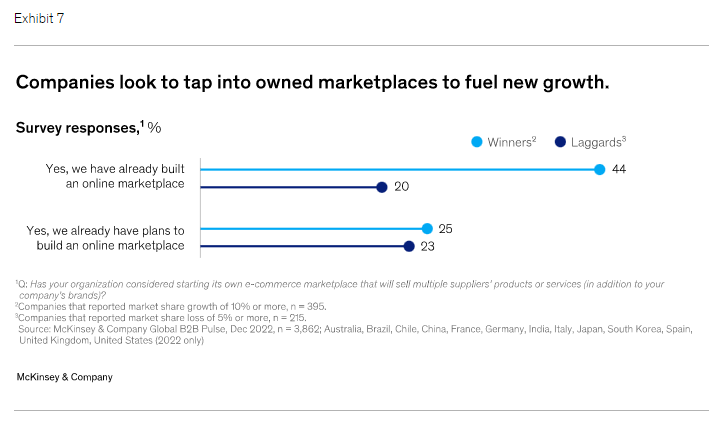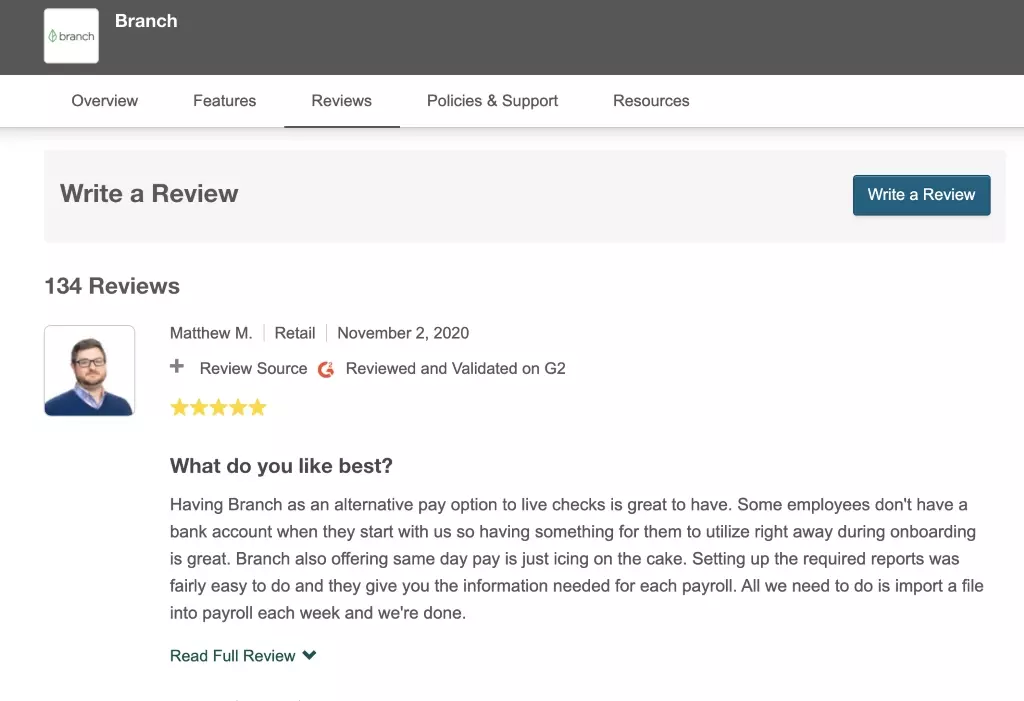You might already have your product or service listed in an app marketplace like the Salesforce AppExchange, Shopify App Store, or Google Workspace Marketplace.
And as you know, adding your offering to these best-in-class app marketplaces increases your brand awareness, clout, and, most importantly, your access to hot leads.
But companies like Salesforce, Shopify, and Google Workspace also benefit from this scenario. Customers who buy your app have a better experience with their products, improving adoption and likely expanding their contracts over time.
McKinsey found that the adoption of company-owned marketplaces increased 8% last year and reported that a whopping 40% of the biggest share winners are selling their products online through their own marketplace.
And their competitors are trying to catch up — roughly 50% of companies have either already built or plan to build their own marketplace.
What if you could recreate those same benefits for your partners and your company?
App marketplace software, also known as “multivendor marketplaces,” allows you to establish your own marketplace, showcasing product and service offerings from multiple partners at once. These tools make setting up and managing an online storefront easy with built-in hosting, payment, security, and vendor communication features.
But as with any software, not all app marketplace solutions are created equal. Read on to learn why you should take advantage of the exploding app marketplace software market, and the ins and outs of the five best app marketplace tools.
Why App Marketplace Software?
According to Canalys, a renowned research firm that tracks the channels ecosystem, the marketplace and integrations market hit $275 million last year, a significant portion of the overall channel software market.
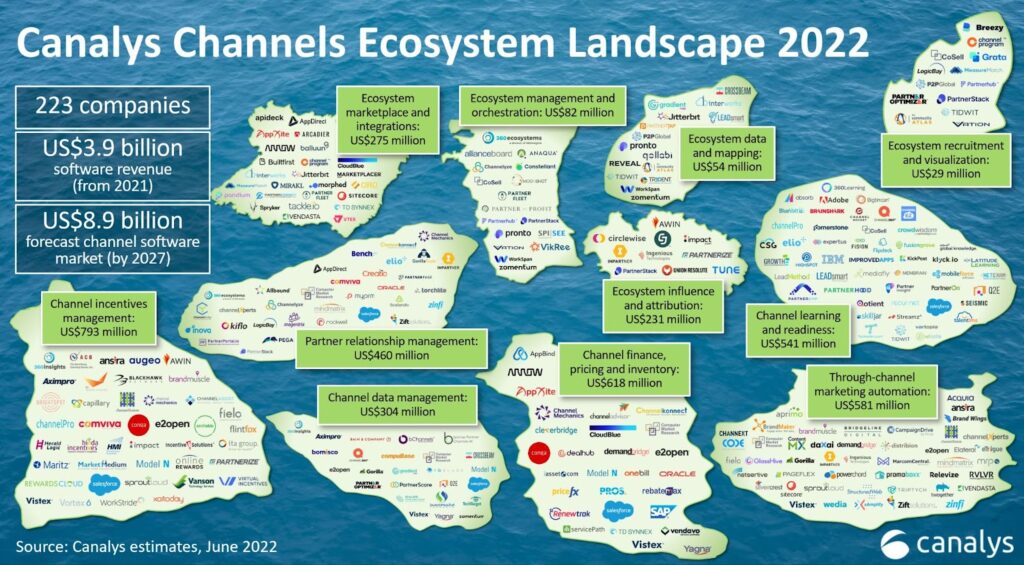
And it will continue to grow. The latest Canalys forecasts show that the channel software market will reach a whopping $8.9 billion in revenue by 2027. Why?
Partnerships are key to a company’s success, increasing visibility, pipeline flow, and deal viability. And at a certain point in a company’s partner growth trajectory, it makes sense to create a central repository of integration and solution partners that your customers can browse and engage with.
A public-facing app marketplace streamlines the process of co-marketing, co-selling, and co-innovating. Customers can self-serve, finding new solutions that augment or complement your product, which increases customer satisfaction and revenue for you and your partners.
But building an e-commerce-style platform from scratch is a huge undertaking that likely won’t get IT or engineering’s time or attention. That’s where app marketplace software comes into play. These tools have all the features you need to stand up and sustain a multi-vendor digital storefront out of the box.
5 Best App Marketplace Software Vendors to Know
Here’s a rundown of our top app marketplace picks to consider during your evaluation:
1. Partner Fleet
Partner Fleet allows users to launch white-labeled partner marketplaces in weeks. Partner Fleet’s directory design makes it easy for customers to find and enable integrations and simplifies the partner onboarding process. Notably, Partner Fleet’s marketplace software powers the G2 Partner Hub.
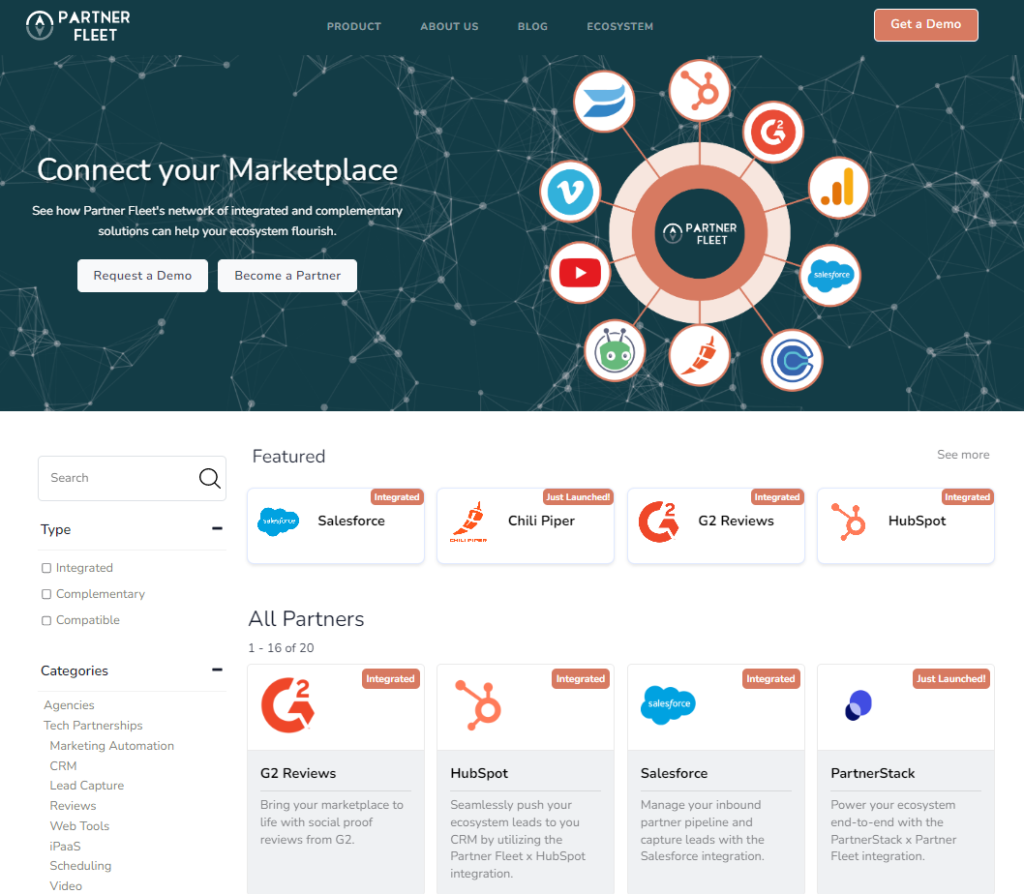
Ideal Use Case
Partner Fleet has several channel-focused use cases:
Partner directory: This looks similar to a HubSpot or AWS-style marketplace, with listings for every partner complete with their logo, screenshots, and customizable call to action. Customers can easily search for integrations they want or need with categories and filtering options. And internal teams can use the directory as a reference guide.
Partner portal: The portal serves as the back-end onboarding part of the marketplace. Partners can customize their listings, build forms, and access your documentation.
Partner microsite: Partner Fleet’s microsite looks and feels like a Wiki or knowledge library and can serve as the front-end of your marketplace. Prospective partners can request access to the portal and learn about your programs.
Developer portal: In this section of the platform, developers can view API docs, submit app proposals, request tech reviews, and provide demo instances.
Pros
- Has 4 different customizable components: a directory, partner portal, partner microsite, and a developer portal
- Directories can boost your SEO with optimization partner landing pages
- Includes reviews powered by G2
- They show you how the marketplace looks with their own ecosystem embedded in their website
- Relatively simple to use: designed as a “Marketplace-in-a-Box” that can be launched in weeks without writing a line of code.
Cons
- Lack of deal flow tracking in their product
- They have a small team with less time for troubleshooting and working through other customer service issues
- Partner Fleet is a relatively new platform, meaning it could be buggy (launched in 2021)
Pricing
Custom; contact sales.
2. PartnerPage
The main use case for PartnerPage is a partner directory, where partners can gain recognition as official partners, and customers can find the partners they want to work with.
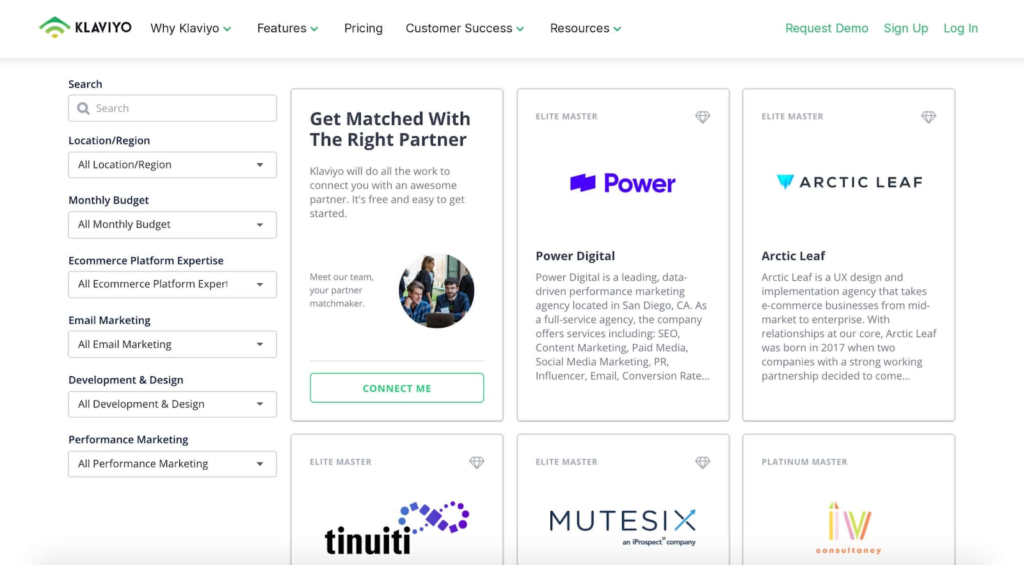
Ideal Use Case
Partner directory: Instead of constantly updating web pages with new agency and technology partners, partners can add themselves to a PartnerPage-powered directory that you can link to or embed in your website.
Pros
- Trusted by known B2B SaaS companies like Zapier, Klaviyo, and Mixpanel
- Automatic matchmaking and outbound referral management
- Users can cancel at any time
- Highlights partner tiers, badges, and reviews
- PartnerPage provides a dedicated CSM to its customers to help with migration, solution development, and customization
Cons
- Also a relatively new platform (launched in 2019)
- Doesn’t have native language localization unless you pay for a custom plan
Pricing
Standard: $1500 per mo, with 50% discount available for startups.
Custom: Add-ons like integration development, custom feature development, SSO.
3. Pandium
Pandium markets itself as the first IMaaS, or Information Management as a Service. Its cloud-based platform supports developers with tools to manage information across a product or integration’s lifecycle. Pandium empowers SaaS companies to “build and enter integration marketplaces at record speed.”
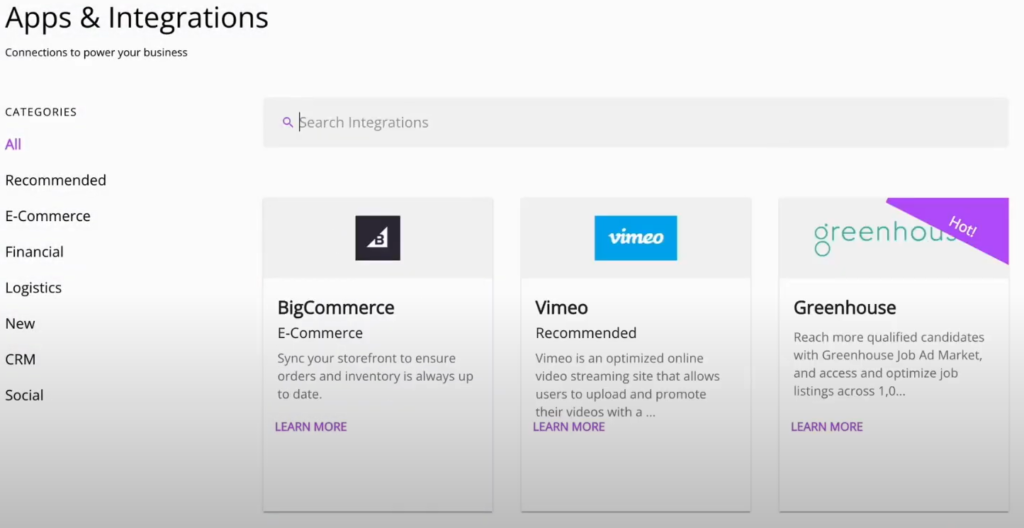
Ideal Use Case
Partner portal: Partners can submit a fully-baked app for consideration, including marketing materials and onboarding flows. When you approve the app, it goes up on the portal and is tracked for activity and installs that you and your partners can monitor via pre-built dashboards.
Pros
- Users can write customer-agnostic integrations
- Excellent support team
- Pandium can plug into warehouse management systems and eliminate complex external authentication to third parties
- Has been around longer than other marketplace vendors (launched in 2017)
Cons
- Developer experience is still lacking
- Relatively steep learning curve
- No storage mechanism
Pricing
Custom; contact sales.
4. Builtfirst
Founded in 2020, Builtfirst makes it easy for partner leaders to launch a cloud marketplace that promotes offerings from their SaaS technology and services partners. The Builtfirst platform lets admins customize the vendor discovery experience for their customers by dynamically adding, promoting, and removing trusted vendors in the Builtfirst directory.
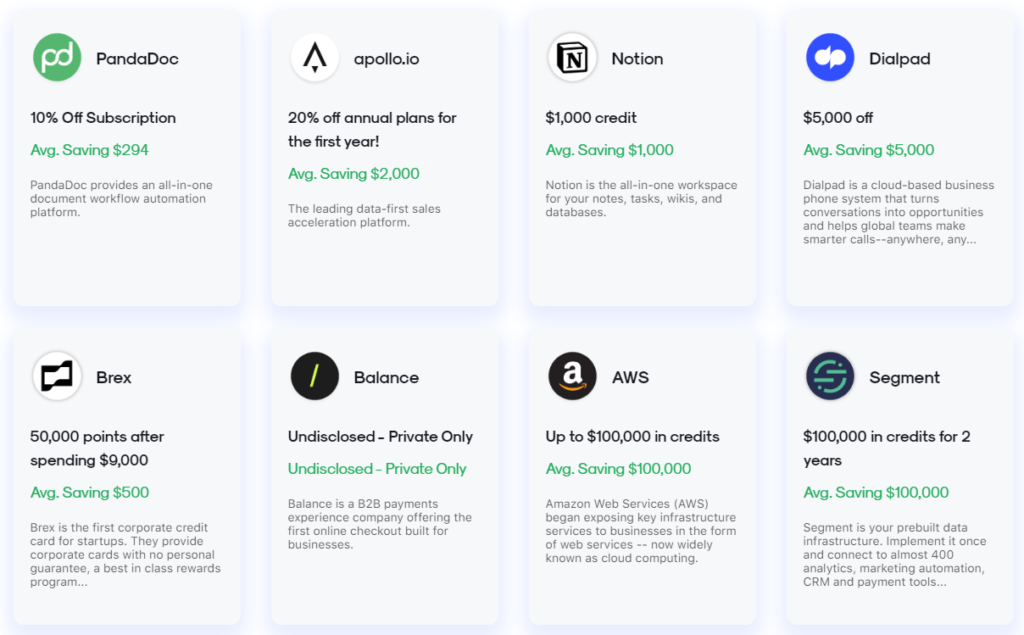
Ideal Use Case
Vendor discounts: Builtfirst was designed with modern referral and affiliate structures in mind, enabling users to launch app marketplaces in minutes that highlight vendor deals.
To accelerate go live, Builtfirst has an existing curated vendor library and an easy onboarding process for existing partners. Once implemented, the Builtfirst platform gives users visibility into what prospective buyers want and shows vendors how their offerings perform with a robust analytics backend.
Pros
- Hundreds of top providers are already offering exclusive deals through Builtfirst, so people are likely familiar with it (Carta, Vanta, Airtable)
- Known in the VC community
- Gives vendors insight into how their offers are performing so they can better tailor them to your customer base
- You can embed the Builtfirst portal into your website
Cons
- It’s mostly focused on discounted offers rather than integrations
- It’s more of a fit for VCs, community managers, or accelerators who have partners that want to score deals with startups and grow with them as they scale.
Pricing
Custom; contact sales.
- Hundreds of top providers are already offering exclusive deals through Builtfirst, so people are likely familiar with it (Carta, Vanta, Airtable)
- Known in the VC community
- Gives vendors insight into how their offers are performing so they can better tailor them to your customer base
- You can embed the Builtfirst portal into your website
5. AppDirect
AppDirect is one of the oldest subscription-based commerce platforms for buying, selling, and managing B2B applications. Since 2009, AppDirect has enabled companies to customize their turnkey marketplaces with robust APIs, product settings, payments, and usage analytics.
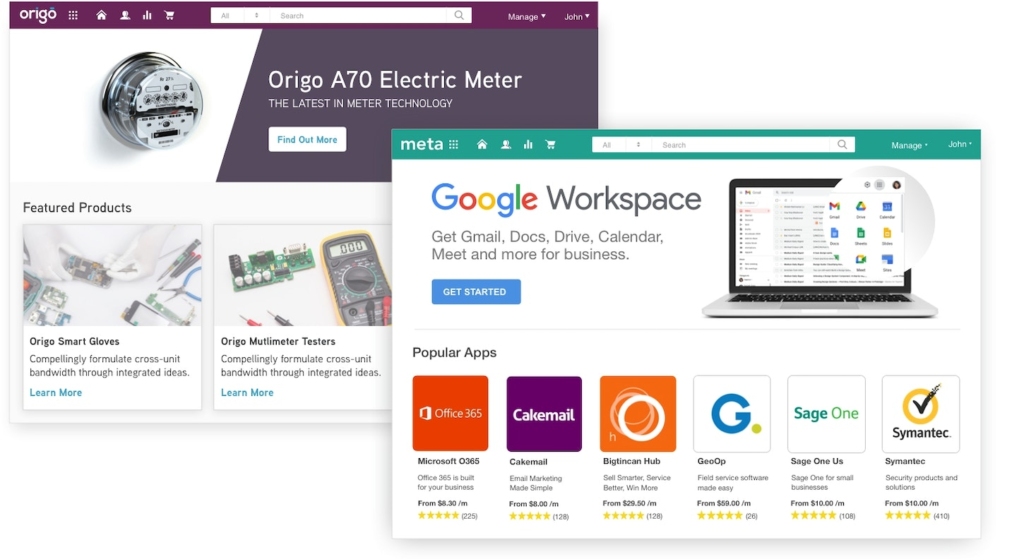
Ideal Use Case
Complex partner directories and marketplaces: AppDirect is an all-in-one marketplace that empowers users to sell, ship, and manage virtually any product or bundle of apps with rich product profiles, advanced merchandising, and a simple checkout flow. Best suited for larger organizations with developer resources for building a marketplace.
AppDirect also has 300+ SaaS/IaaS integrations like Adobe, DocuSign, and Microsoft O365 you can copy directly to your catalog.
Pros
- Named a leader in the Q4 2021 Forrester New Wave: Marketplace Development Platforms list
- Trusted by T-Mobile, Intuit, and ADP
- Can monitor live applications and integrations with KPI dashboards
- Comes with a free procurement platform with access to the AppDirect catalog
- Can easily customize branding and layout with a drag-and-drop configurator
Cons
- Some reviews lamented about AppDirect’s change management and maintenance
- Platform can be glitchy, resulting in lost work
Pricing
- Starter: $799 per month; best for mid-size companies who want to monetize their referral business
- Professional: $1,499 per month; best for mid-size companies selling their technology
- Custom Pricing: Best for enterprise companies selling technology who need extra integration support
6. BONUS: G2 Integrations For Marketplaces
G2 isn’t an app marketplace software, but G2 integrations can augment your marketplace with reviews if they aren’t built into the platform.
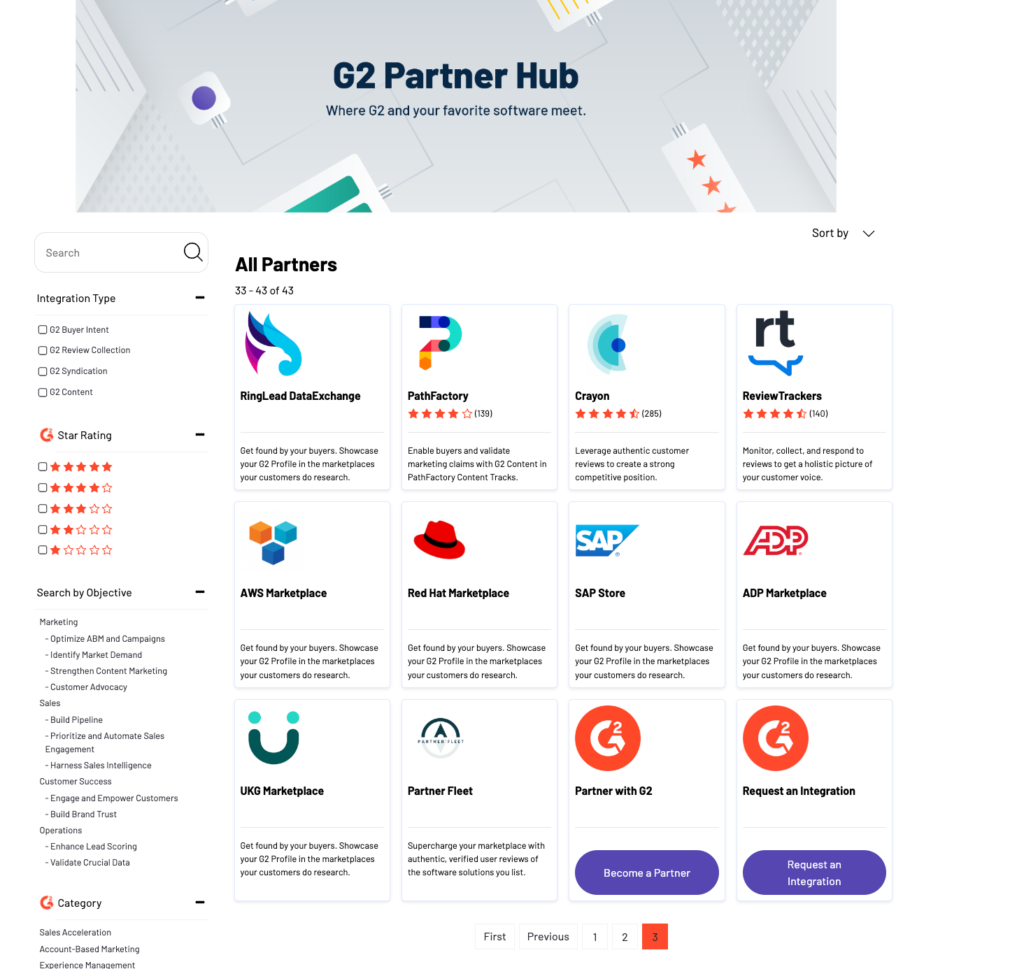
Several companies like Red Hat, SAP, and UKG have added existing G2 reviews to their marketplace to show customers what their peers have said about each vendor.
In theory, you could use G2 to review specific partner integrations as well. Users who write new integration reviews could publish them on the vendor’s G2 profile, your marketplace, or both.
Maximize Your Co-Selling Potential
Creating your own app marketplace can have myriad benefits, from visibility to convenience to security.
Choosing the right app marketplace vendor can help you capitalize on that potential, introducing you and your partners to more cross- and upselling opportunities while improving your customers’ overall experiences.
Want more tips to broaden your reach through reviews and marketplaces? Read:
Authors
-
Elizabeth Melton is a freelance content writer and partnerships consultant for B2B SaaS companies. She's worked at Accenture as a Salesforce consultant and held several GTM roles at companies like BlackLine and Molina, and startups like Retina AI, mParticle, and Coco. She's written for B2B SaaS companies like Navattic, Channeltivity, and Zapier and VCs like Insight Partners and Firstmark Capital. You can see her past work on past work and testimonials on her website: www.lizthewordsmith.com
-
I'm the Founder and Editor-In-Chief of B2B SaaS Reviews. I'm also the Director of Demand Generation at PartnerStack, the #1 platform purpose-built for partner management and affiliate marketing in B2B SaaS. Before PartnerStack, I worked for other go-to-market B2B SaaS companies: Influitive (Advocate Marketing designed to generate more reviews, references, and referrals), LevelJump (Sales Enablement) (acquired by Salesforce) and Eloqua (Marketing Automation) (acquired by Oracle).


